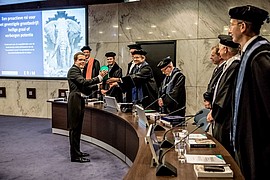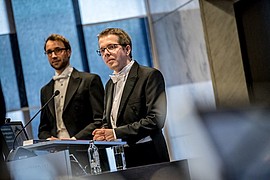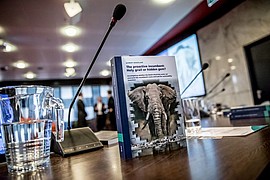PhD Defence: Gerbert Hengelaar

In his dissertation ‘The Proactive Incumbent: Holy grail or hidden gem?’ Gerbert Hengelaar develops a framework to differentiate between four types of incumbent strategies and demonstrates how the proactiveness of the mindset of the incumbent’s leadership is crucial to understand the differences between them.
Gerbert defended his dissertation in the Senate Hall at Erasmus University Rotterdam on Friday, 1 December 2017 at 9:30. His supervisor was <link people rob-van-tulder>Prof. Rob van Tulder and his co-supervisor was Dr Koen Dittrich. Other members of the Doctoral Committee are <link people muel-kaptein>Prof. Muel Kaptein (RSM), Prof. Derk Loorbach (EUR/DRIFT), Prof. Kornelis Blok (TU-Delft), Prof. Jan Peter Balkenende (EUR), Prof. Marko Hekkert (UU).
About Gerbert Hengelaar

Gerbert Hengelaar was born July 31st 1983 in Lienden. He received his Masters degree in Industrial Engineering and Management at Universiteit Twente in 2007. During his studies in Twente he developed an understanding of the growing relevance of sustainability to business and discovered that in participating in this movement his values and competencies could be combined in a unique sense. Since then he has worked for TNT, Boer&Croon, IFES and Next2Company, on the intersection of strategic management, innovation and business development, always with a focus on business models with a positive impact. He has made a contribution to several sustainability initiatives such as the Access to Seeds Index, the Lean & Green innovation hub and the Innovating Justice Accelerator. Currently, he works as an impact strategist at Next2Company, a boutique firm focused on developing sustainable business models with an entrepreneurial approach.
During his time at TNT, Gerbert’s academic curiosity was triggered with regard to the opportunities and complexities for incumbents to lead in sustainability transitions. He developed a proposal for research as an external PhD in conversation with Prof. Dr. Rob van Tulder of the Rotterdam School of Management. In mid-2010 he joined the Researchers Inc. group of the Partnership Resource Centre lead by van Tulder. This thesis is the result of seven years of research activities alongside of four consecutive jobs in practice. In the near future, Gerbert hopes to contribute to the further dissemination of the findings of this thesis in both the academic world and practice and investigate opportunities to pursue some of many opportunities for further research.
Thesis Abstract

Why is the contribution of incumbents to sustainability transitions so heavily debated? And is it possible in practice for incumbents to pursue a proactive strategy? This thesis contributes by developing a framework to differentiate between four types of incumbent strategies and demonstrates how the proactiveness of the mindset of the incumbent’s leadership is crucial to understand the differences between them. The operationalization of the concept is made more reliable and dynamic by integrating concepts from the innovation and transitions literature. This framework is applied in the context of the Dutch electricity sector in the midst of the Energy transition. It is demonstrated that a proactive strategy by an incumbent is possible and that it improves the firm’s survival chances, can prevent costly write-downs of stranded assets, can leverage their societal relevance and impact, and can be a path to build competitive advantage.
Incumbent executives can find in this thesis an extensive argument to support the adoption of proactive strategies in key sustainability transitions. The presented case also provides a rich illustration on the tactics of proactive incumbents to facilitate transformation. For policy makers and other stakeholders this thesis provides evidence that incumbents are highly relevant actors in transitions and can make a strong positive contribution. The thesis develops tools to reliably differentiate between incumbent strategies and emphasizes that policies supporting active and proactive strategies are not the same. Finally, specific recommendations for the Electricity sector are presented
Photos: Chris Gorzeman / Capital Images


